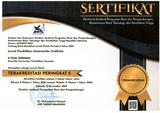PENGARUH MODEL PEMBELAJARAN GROUP INVESTIGATION DENGAN METODE CO-OP CO-OP TERHADAP PEMAHAMAN KONSEP MATEMATIKA SISWA SMP
DOI:
https://doi.org/10.23887/jjpm.v2i1.2819Abstract
Penelitian ini bertujuan untuk mengetahui ada tidaknya perbedaan pemahaman konsep matematika antara siswa yang dibelajarkan dengan model pembelajaran Group Investigation dengan metode Co-op co-op, model pembelajaran Group Investigation dan model pembelajaran konvensional. Lebih lanjut, dari perbedaan tersebut akan diselidiki siswa yang dibelajarkan dengan model pembelajaran mana yang memiliki pemahaman konsep matematika yang paling baik. Desain penelitian yang digunakan dalam penelitian ini adalah Post-test Only Control Group Design. Adapun populasi pada penelitian ini adalah seluruh siswa kelas VIII non unggulan SMP Negeri 1 Singaraja tahun ajaran 2012/2013, yaitu sebanyak 182 orang. Pengambilan sampel dilakukan dengan teknik random sampling. Data hasil tes pemahaman konsep matematika dianalisis menggunakan Uji ANAVA Satu Jalur. Hasil pengujian hipotesis menunjukkan bahwa terdapat perbedaan pemahaman konsep matematika pada ketiga kelas sampel. Lebih lanjut, diperoleh bahwa: (1) siswa yang dibelajarkan dengan model pembelajaran Group Investigation dengan metode Co-op co-op mempunyai pemahaman konsep matematika lebih baik daripada siswa yang dibelajarkan dengan model pembelajaran Group Investigation, (2) siswa yang dibelajarkan dengan model pembelajaran Group Investigation dengan metode Co-op co-op mempunyai pemahaman konsep matematika lebih baik daripada siswa yang dibelajarkan dengan model pembelajaran konvensional, dan (3) siswa yang dibelajarkan dengan model pembelajaran Group Investigation mempunyai pemahaman konsep matematika lebih baik daripada siswa yang dibelajarkan dengan model pembelajaran konvensional. Dengan demikian dapat disimpulkan bahwa model pembelajaran Group Investigation dengan metode Co-op co-op berpengaruh positif terhadap pemahaman konsep matematika siswa.Kata Kunci : model pembelajaran Group Investigation, metode Co-op co-op, pemahaman konsep matematika
This research is aimed to know whether there is any difference in mathematical concepts understanding between the students are learned by the Group Investigation learning model with Co-op co-op method, the Group Investigation learning model and conventional learning model. Furthermore, the differences will be investigated students who learned with the learning models which have mathematical concepts understanding are the best. The research design used in this research is the Post-test Only Control Group Design. The population in this research was all non-leading eighth grade students of SMP Negeri 1 Singaraja in the academic year 2012/2013, as many as 182 people. The process of selecting the sample was done by a random sampling technique. The data of mathematical concept understanding were analyzed by ANAVA-one-way. The results of hypothesis testing showed that there are differences in the mathematical concepts understanding in third grade sample. Furthermore, obtained that: (1) students who learned by the Group Investigation learning model with Co-op co-op method have mathematical concepts understanding is better than students who learned with the Group Investigation learning model, (2) students who learned by the Group Investigation learning model with Co-op co-op method have mathematical concepts understanding is better than students who learned with the conventional learning model, and (3) students who learned by the Group Investigation learning model have mathematical concepts understanding is better than students who learned with the conventional learning model. It can be concluded that the Group Investigation learning model with Co-op co-op method has a positive influence on the student’s mathematical concepts understanding.
keyword : Group Investigation learning model, Co-op co-op method, mathematical concepts understanding
Published
2014-03-06
Issue
Section
Articles
License

Jurnal Pendidikan Matematika Undiksha is licensed under a Creative Commons Attribution-ShareAlike 4.0 International License.





